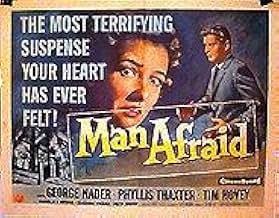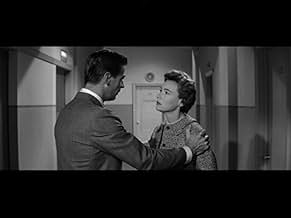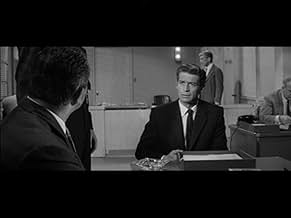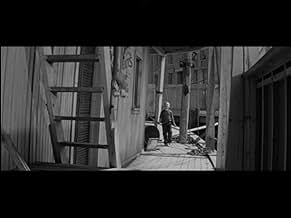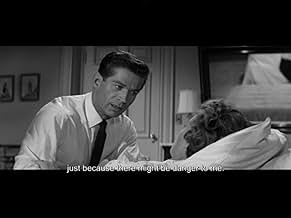Un ladrón es sorprendido por David y Lisa Collins en la habitación de su hijo. En el forcejeo, Lisa resulta herida en los ojos y David lanza un adorno, matando involuntariamente al joven lad... Leer todoUn ladrón es sorprendido por David y Lisa Collins en la habitación de su hijo. En el forcejeo, Lisa resulta herida en los ojos y David lanza un adorno, matando involuntariamente al joven ladrón.Un ladrón es sorprendido por David y Lisa Collins en la habitación de su hijo. En el forcejeo, Lisa resulta herida en los ojos y David lanza un adorno, matando involuntariamente al joven ladrón.
- Dirección
- Guión
- Reparto principal
Tom Nolan
- Ronnie 'Skunky' Fletcher
- (as Butch Bernard)
Carlos Albert
- Congregation Member
- (sin acreditar)
Larry Arnold
- Congregation Member
- (sin acreditar)
Benjie Bancroft
- Boxing Match Spectator
- (sin acreditar)
John Barton
- Congregation Member
- (sin acreditar)
Paul Bradley
- Boxing Match Spectator
- (sin acreditar)
Tex Brodus
- Boxing Match Spectator
- (sin acreditar)
Ralph Brooks
- Congregation Member
- (sin acreditar)
George Calliga
- Boxing Match Spectator
- (sin acreditar)
Reseñas destacadas
The reverend George Nader hears noise from his son's bedroom and goes in to investigate. He leaves the lights off to avoid waking the child. When he dimly sees a burglar, he throws a snow globe at him, and kills him. After police lieutenant Harold Stone investigates, he goes home. The papers cover the news, and we see shots of the burglar's father, tailor Eduard Franz, ripping the seams out of a coat with a razor.
Odd things start happening, and eventually Nader concludes that Franz is stalking Nader's son, Tim Hovey. The police refuse to do anything because of lack of evidence.
It's a very slow and very flat build-up, so much so that all the suspense was drained out of the story, and Nader's near-constant, solemn and pastoral demeanor don't help much. There's some good camerawork by DP Russell Metty, including views of the seedy parts of Santa Monica Pier. With Phyllis Thaxter, Reta Shaw and Martin Milner.
Odd things start happening, and eventually Nader concludes that Franz is stalking Nader's son, Tim Hovey. The police refuse to do anything because of lack of evidence.
It's a very slow and very flat build-up, so much so that all the suspense was drained out of the story, and Nader's near-constant, solemn and pastoral demeanor don't help much. There's some good camerawork by DP Russell Metty, including views of the seedy parts of Santa Monica Pier. With Phyllis Thaxter, Reta Shaw and Martin Milner.
George Nader is the priest who is visited by a burglar at home scaring the wits out of his young son and his wife, but Nader interrupts the burglar in his act, there is a fight, and accidentally the priest kills the burglar by just throwing a hard object at him, in defence of his son, his wife and himself. He can not be convicted of the homicide, while at the same time he refuses to call it an act of self defence, as the death of the burglar nails his conscience. The burglar succeeded in damaging his wife's eyes at that, and she has to remain blindfolded from now on, until it becomes clear whether she may keep her sight or not. Since the burglar is dead and the priest can't be prosecuted, the case seems to be closed, but the burglar had a father, and here is the complication. The father can't get over it, and starts stalking the reverend's boy. The reverend tries to come to terms with him, which proves impossible. That father never speaks a word throughout the film.
It's an educating study in the mentalities of fathers, a failed father, another father whose boy ends up in hospital, and the father of the criminal, whose depths of unfathomable anguish we can never understand, as little as his way of acting. He probably isn't aware himself of what he is doing in persecuting the boy. What really gives the film some dynamic dimension is the terrific music by Henry Mancini. It is brutal, subconsciously suggestive and horribly intrusive, like a dramatic illustration of the common nightmare of all the protagonists. The film is unique in many ways, as I've never seen any film trying to cope with the same kind of dilemma of conscience, despair and death.
It's an educating study in the mentalities of fathers, a failed father, another father whose boy ends up in hospital, and the father of the criminal, whose depths of unfathomable anguish we can never understand, as little as his way of acting. He probably isn't aware himself of what he is doing in persecuting the boy. What really gives the film some dynamic dimension is the terrific music by Henry Mancini. It is brutal, subconsciously suggestive and horribly intrusive, like a dramatic illustration of the common nightmare of all the protagonists. The film is unique in many ways, as I've never seen any film trying to cope with the same kind of dilemma of conscience, despair and death.
Growing up, my list of favorite action heroes was an odd one, including George Nader, who I enjoyed starring in that series of German-made B movies beloved by TV syndication packages (similarly, Klaus Kinski my favorite villain from his endless Edgar Wallace junkers -imagine my thrill in 1981 interviewing the great KK when "Venom" was released!).
Here we have Nader starring as a most unusual man of the cloth, playing perhaps the obverse of the character played by Charles Bronson in "Death Wish" two decades later. Watching this Universal-International release on Youtube in glorious CinemaScope and crisp black & white just now was a reminder of the late '50s when theaters were a great leveller - little movies given a deluxe treatment. In fact, here's a Nader vehicle shot by the great Russell Metty and boasting an original score by Henry Mancini!
The problem with "Man Afraid" is very, very poor pacing. The opening reel dramatically sets the table: putting all the elements of suspense and thrills in play, then for seemingly a full hour the picture just lies there, not action-packed, not heroic, but merely repetitive. Eduard Franz as the silent, dour bad guy wanders around threateningly, and given that this came from Universal Pictures, I immediately thought of The Mummy, that shambling horror figure in the studio's pantheon who is the least frightening of all, desperately in need of a shot of industrial strength Geritol.
Nader is earnest and forced to carry the movie single-handed, while poor Phyllis Thaxter as his wife is scripted pathetically, literally.
Here we have Nader starring as a most unusual man of the cloth, playing perhaps the obverse of the character played by Charles Bronson in "Death Wish" two decades later. Watching this Universal-International release on Youtube in glorious CinemaScope and crisp black & white just now was a reminder of the late '50s when theaters were a great leveller - little movies given a deluxe treatment. In fact, here's a Nader vehicle shot by the great Russell Metty and boasting an original score by Henry Mancini!
The problem with "Man Afraid" is very, very poor pacing. The opening reel dramatically sets the table: putting all the elements of suspense and thrills in play, then for seemingly a full hour the picture just lies there, not action-packed, not heroic, but merely repetitive. Eduard Franz as the silent, dour bad guy wanders around threateningly, and given that this came from Universal Pictures, I immediately thought of The Mummy, that shambling horror figure in the studio's pantheon who is the least frightening of all, desperately in need of a shot of industrial strength Geritol.
Nader is earnest and forced to carry the movie single-handed, while poor Phyllis Thaxter as his wife is scripted pathetically, literally.
This 1957 movie is fairly typical of a certain type of film from the fifties, usually made in black and white, often a thriller or crime drama, heavy on the suspense, with hints of madness, obsession or perversity of some sort in the villain. Most of these movies were made independently, but some studios ground them out, too. This one's a studio job, with a good deal of location shooting, and is a tad better than the average.
Competently directed by Harry Keller, a veteran of this sort of thing, the plot revolves around a gentle, decent minister stalked by the father of a man he killed accidentally during a robbery. Most of the cast is competent if unexciting for the most part, with only Harold J. Stone really outstanding in his role as a police lieutenant. He handles his dialog excellently. The big surprise with with this one is the performance of George Nader in the lead. Never the most compelling of actors, I generally find Nader lacking in credibility in most everything he did. In this picture, however, he's excellent as the upstanding reverend. His acting is well above average for him, and elicits genuine sympathy, from this viewer anyway, and this made watching this otherwise generic movie a pleasant surprise.
Competently directed by Harry Keller, a veteran of this sort of thing, the plot revolves around a gentle, decent minister stalked by the father of a man he killed accidentally during a robbery. Most of the cast is competent if unexciting for the most part, with only Harold J. Stone really outstanding in his role as a police lieutenant. He handles his dialog excellently. The big surprise with with this one is the performance of George Nader in the lead. Never the most compelling of actors, I generally find Nader lacking in credibility in most everything he did. In this picture, however, he's excellent as the upstanding reverend. His acting is well above average for him, and elicits genuine sympathy, from this viewer anyway, and this made watching this otherwise generic movie a pleasant surprise.
I was well entertained by this late 50's film. Normally movies like this have a slow pacing, however this one is more interesting and the pacing is terrific. Your eyes will never leave the screen start to finish.
The plot concerns Rev. David Collins(played by George Nader) who surprises a burglar in his house and accidentally kills him. Feeling profound remorse for his actions, he tries to apologize to the victim's father Carl Simmons(played by Eduard Franz), who is a tailor by profession.
However Carl will hear none of it. He refuses to speak to David. Meanwhile David tries again and again to appeal to Carl's sensibilities.
What will happen next is for you to see and find out!
Verdict: excellent acting, background music, direction and script. I would also recommend for your collection of 50's thriller movies.
The plot concerns Rev. David Collins(played by George Nader) who surprises a burglar in his house and accidentally kills him. Feeling profound remorse for his actions, he tries to apologize to the victim's father Carl Simmons(played by Eduard Franz), who is a tailor by profession.
However Carl will hear none of it. He refuses to speak to David. Meanwhile David tries again and again to appeal to Carl's sensibilities.
What will happen next is for you to see and find out!
Verdict: excellent acting, background music, direction and script. I would also recommend for your collection of 50's thriller movies.
¿Sabías que...?
- CuriosidadesFeature-film debut of Troy Donahue in an uncredited role.
- Banda sonoraFather of Mercy, Lover of all Children (St Elizabeth)
Words by Francis John Moore, 1935
Music by Silesian Melody, pub. Leipzig, 1842
Selecciones populares
Inicia sesión para calificar y añadir a tu lista para recibir recomendaciones personalizadas
- How long is Man Afraid?Con tecnología de Alexa
Detalles
- Fecha de lanzamiento
- País de origen
- Sitios oficiales
- Idioma
- Títulos en diferentes países
- Überall lauert der Tod
- Localizaciones del rodaje
- Santa Monica Pier, California, Estados Unidos(Photograph)
- Empresa productora
- Ver más compañías en los créditos en IMDbPro
- Duración
- 1h 24min(84 min)
- Color
- Relación de aspecto
- 2.35 : 1
Contribuir a esta página
Sugerir un cambio o añadir el contenido que falta

